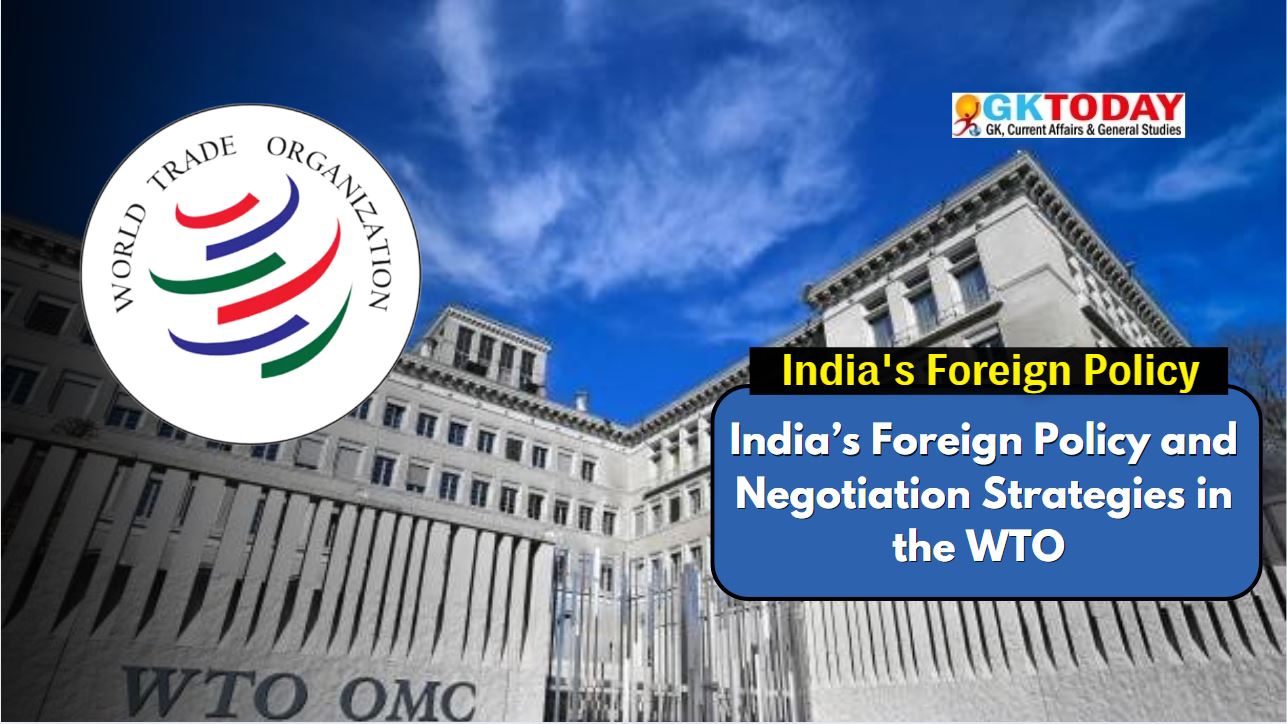India’s Foreign Policy and Negotiation Strategies in the WTO [UGC-NTA Net Political Science]
India’s foreign policy is shaped by its historical context, economic needs, and international relations. A aspect of this policy is its engagement with global trade organisations, particularly the World Trade Organisation (WTO).
Overview of the WTO
The World Trade Organisation (WTO) was established on January 1, 1995. Its main purpose is to regulate international trade and ensure that trade flows as smoothly, predictably, and freely as possible. As of 2023, the WTO comprises 164 member countries.
Key Agreements
The WTO operates through several key agreements, including:
- General Agreement on Tariffs and Trade (GATT)
- Trade-Related Aspects of Intellectual Property Rights (TRIPS)
- General Agreement on Trade in Services (GATS)
These agreements set the rules for international trade and help resolve disputes between member nations.
India’s Membership in the WTO
India became a founding member of the WTO on its establishment date. Since then, it has played an active role in negotiations and decision-making processes.
Objectives of India in the WTO
India’s primary objectives within the WTO include:
- Protecting domestic industries
- Promoting exports
- Ensuring food security
These goals reflect India’s commitment to balancing international obligations with national interests.
Key Negotiation Strategies Employed by India
India employs several negotiation strategies to enhance its position in the WTO.
Coalition Building
India collaborates with other developing countries, forming coalitions such as the G-33 and G-20. This collective bargaining approach strengthens its negotiating power. Additionally, India engages with BRICS nations to boost its stance on various issues.
Defensive and Offensive Interests
India’s negotiation strategy includes both defensive and offensive interests:
- Defensive – Protecting agriculture, textiles, and services sectors.
- Offensive – Promoting IT services, pharmaceuticals, and software exports.
This dual approach allows India to safeguard its vulnerabilities while advancing its economic interests.
Focus on Special and Differential Treatment (SDT)
India advocates for Special and Differential Treatment (SDT) provisions. These allow developing countries longer time frames for implementing agreements. India emphasises flexibility in commitments, recognising the unique challenges faced by developing nations.
Food Security and Public Stockholding
India strongly supports measures for food security. It advocates for the right to subsidise food for the poor. India has engaged in negotiations for a permanent solution on public stockholding to protect its food security interests.
Intellectual Property Rights (IPR)
India negotiates to ensure access to affordable medicines. It opposes stringent IPR norms that could restrict access to essential goods. This stance is vital for maintaining public health and welfare.
Trade Facilitation Agreement (TFA)
India supports the Trade Facilitation Agreement (TFA) but stresses the need for capacity-building assistance for developing countries. This ensures that all nations can benefit from improved trade processes.
Challenges Faced by India in WTO Negotiations
India faces several challenges in its WTO negotiations.
Developed vs. Developing Countries
There are ongoing tensions between developed and developing nations. Developed countries often push for stricter trade rules, while developing countries advocate for more flexibility. This divide complicates consensus-building.
Domestic Pressure
India must balance its international commitments with domestic interests. Agricultural and industrial sectors often exert pressure to protect local jobs and industries.
Global Economic Shifts
India must adapt to changing global trade dynamics. The rise of regional trade agreements presents both opportunities and challenges for India’s negotiation strategies.
Recent Developments and Positions
India’s approach in the WTO has evolved in response to recent global developments.
Post-COVID-19 Trade Dynamics
In the aftermath of the COVID-19 pandemic, India has advocated for reforms in global supply chains. It seeks to enhance resilience in trade rules to better prepare for future crises.
Sustainable Development Goals (SDGs)
India aligns its trade policies with the Sustainable Development Goals (SDGs). It focuses on environmental sustainability and social equity, ensuring that trade contributes positively to global challenges.
Digital Trade
India is increasingly engaging in discussions on e-commerce and digital trade regulations. It emphasises the importance of data privacy and security in the digital economy.
India’s Influence in the WTO
India plays role in the WTO, particularly in the Doha Development Round.
Active Participation
India actively participates in discussions focused on development issues. It seeks to ensure that the interests of developing countries are adequately represented.
Leadership Role
India has taken on a leadership role in advocating for the interests of developing nations. It works to amplify their voices in global trade discussions.
Dispute Resolution Mechanisms
India engages in the WTO’s dispute resolution mechanisms. This involvement helps protect its national interests and resolve conflicts with other member nations.
Future Directions
India’s future in the WTO will be shaped by its commitment to multilateralism.
Continued Emphasis on Multilateralism
India will continue to advocate for multilateral solutions in trade negotiations. This approach encourages cooperation and collective problem-solving among nations.
Strengthening Ties with Developing Nations
India aims to strengthen its ties with other developing nations. This collaboration will enhance its bargaining power in future negotiations.
Balancing Trade Liberalisation with Domestic Priorities
India’s focus will remain on balancing trade liberalisation with domestic economic priorities. It seeks to ensure that international commitments do not undermine local industries and livelihoods. Thus, India’s foreign policy and negotiation strategies within the WTO reflect its commitment to protecting national interests while engaging with the global community. Through coalition building, advocacy for developing nations, and a focus on sustainable development, India aims to shape a fair and equitable trading system.



